| |
September 2016
|
|
1. Group developing autonomous capability for long-distance underwater vehicles
Exploration of the oceans of Europa and Titan are two of the next big challenges in extra-planetary exploration. These missions would vastly increase our knowledge of the solar system and, on Europa in particular, may result in the discovery of living organisms. To prepare for this challenge, Professor Brian Williams' group, along with researchers from the Woods Hole Oceanographic Institution and the University of Michigan, has been awarded NASA funding to develop technology for such missions and conduct a mission Earth analog in the Kolumbo volcano caldera in the Aegean Sea. Brian's group is focusing on the development of autonomous planning capabilities to support the deployment of a long-range underwater glider and WHOI's Nereid Under Ice vehicle. They will be providing the high-level planning executive, including risk-aware path and activity planners, as well planners for manipulation. These planning capabilities will interact with terrain aided navigation, chemical classification, and image classification capabilities provided by WHOI and UMich. More details on this research will appear in the upcoming issue of the department's annual publication AeroAstro.
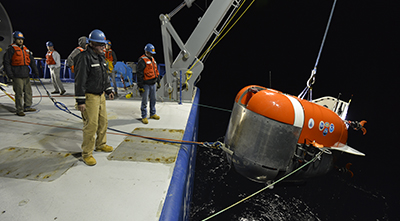
Enterprise, an “executive” system developed by Professor Brian Williams' group, will provide broad autonomous capabilities for a Woods Hole Oceanographic Institute’s Nereid Under Ice vehicle, pictured here on a test deployment as it retrieves samples from a Mediterranean subsea volcano.
|

de Weck
|

2. de Weck taking leave to head Airbus tech planning
Starting this January, Professor Oli de Weck will take a two-year professional leave of absence to serve as Head of Technology Planning for the Airbus Group. Based in Toulouse, France, Oli will serve as project leader "for establishing a rigorous technology planning and roadmapping capability" in the chief technology officer's office. Announcing the appointment, Airbus CEO Tom Enders noted, "Olivier is a world-renowned leader in systems engineering." Oli will return to MIT in 2019. |
|

3. REXIS team visits Kennedy for OSRIS-REX launch
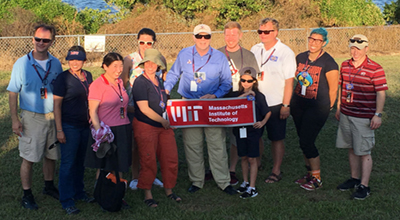
The MIT REXIS team and friends visited Kennedy Space Center for the Sept 8 OSIRIS-REX launch. The spacecraft will rendezvous with asteroid Bennu in 2.5 years, collect a piece of the asteroid, and return it to Earth. REXIS, an MIT student-designed/built x-ray spectrometer aboard O-R, will reveal Bennu's composition and map elemental abundance variability across the its surface. Pictured, from left, are
Jeffrey Mendenhall, Lincoln Lab; Cristina Thomas, EAPS alumna; Lucy Lim, EAPS alumna; Laura Bayley, Lincoln Lab; Richard Binzel, EAPS; Mark Chodas, Lincoln Lab; Jim Kelly, Lincoln Lab; Lisa Johnson, AA alumna; and Mike Jones, AA alumnus. Holding the banner are AeroAstro research scientist Becky Masterson and her daughter, Lily Wong. Becky provided engineering guidance for the REXIS student team and overall instrument management. For her superb work, she's received a special "Award of Distinction" from the project. |
|

4. Isakowitz to lead Aerospace Corp.
Steve Isakowitz (Course 16 '83, SM '84), former president of Virgin Galactic, has been named president of the Aerospace Corporation. Steve is replacing Dr. Wanda Austin who will retire October 1. “After a year-long search process, the board of trustees is pleased with the result. Building on Dr. Wanda Austin’s legacy of excellence and accomplishment, Steve Isakowitz has the right set of skills and experience — in government and industry — to lead Aerospace in a rapidly changing environment of constrained customer resources, challenging threats, and exciting new space technologies,” said Aerospace Corporation board of trustees chair Barbara Barrett.
Isakowitz served as president of Virgin Galactic from 2013 to 2016 and as its chief technology officer from 2011 to 2013. At Virgin Galactic, Isakowitz had broad leadership responsibilities, which included the development of privately funded launch systems, human spaceflight vehicles, advanced technologies, and other new space applications. Previously, he held a wide variety of senior engineering, business, and management roles across the private and government sectors, including positions at NASA, the Office of Management and Budget, and the Department of Energy.
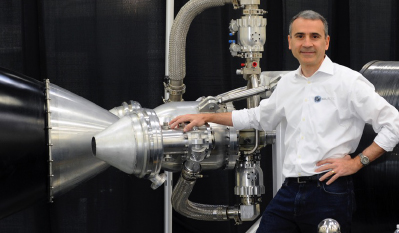
Steve Isakowitz
|

Sheerin

Modiano

Roy

Paul

Balakrishnan
 Gopalakrishnan Gopalakrishnan

Opgenoord

Crawley

Newman

Johnson

Crews

Stirling
 Lozano Lozano
|

5. Honors, awards
Grad student Todd Sheerin (SM '15) has been awarded a National Defense Science and Engineering Graduate Fellowship. The highly competitive fellowships, awarded to U.S. citizens and nationals who intend to pursue a doctoral degree in one of 15 supported disciplines, last for three years and pay for full tuition and all mandatory fees, a monthly stipend, and up to $1,000 a year in medical insurance.
The Association for Computing Machinery has presented Professor Eytan Modiano and grad student Abhishek Sinha with its Mobihoc 2016 Best Paper Award for "Throughput Optimal Broadcast in Wireless Networks with Dynamic Topography."
Professor Nick Roy, and post-doc Rohan Paul received the Robotic Science and System's Conference Best Paper Award for “Efficient Grounding of Abstract Spatial Concepts for Natural Language Interaction with Robot Manipulators.”
The paper “Architecting Delay Dynamics: An Air Traffic Network Example,” co-authored by Professor Hamsa Balakrishnan, grad student Karthik Gopalakrishnan, and Richard Jordan of Lincoln Lab, won the Best Paper (System Performance) Award at the International Conference on Research in Air Transportation.
Grad student Max Opgenoord has been included in the Improper Bostonian magazine's "25X25" list of "the city's next generation all-stars."
Professor Ed Crawley has been elected a member of the International Academy of Astronautics Engineering Sciences Section.
The Aerospace Human Factors Society has awarded Professor Dava Newman its Taylor Award, the Society's highest award, which is "in recognition for outstanding contributions in the field of Aerospace Human Factors"; and Aaron Johnson (SM '10, PhD '15) its Roscoe Award for the best doctoral dissertation. Man Vehicle Lab Senior Research Engineer Chuck Oman notes that these are two of the AHFS's three major awards.
The National Space Grant Foundation has announced that grad student Angie Crews has been named a John Mather Nobel Scholar. The program awards travel allowances towards the cost of presenting research papers at professional conferences. Applicants must have demonstrated high academic achievement, have a strong interest in space and Goddard Space Flight Center, be a rising undergraduate junior, senior or graduate student, and hold a Goddard-based research internship.
The National Academy of Engineering has selected Professor Leia Stirling to participate in its 2016 US Frontiers of Engineering program. The program sponsors meetings that bring together select emerging engineering leaders from industry, academic, and government labs to discuss pioneering technical work and leading edge research in various engineering fields and industry sectors.
Professor Paulo Lozano has received an AIAA Technical Excellence Award for his Cubesat ion electrospray propulsion system.
Grad student Cory Frontin has been awarded a NASA Graduate Aeronautic Scholars fellowship.
___________________________________
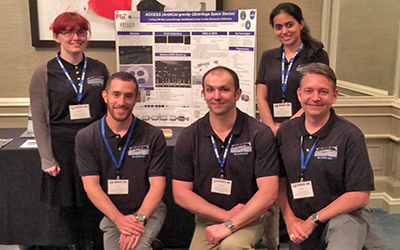
An MIT AeroAstro team comprising (from left) grad students Charlotte Lowey, Sam Wald, Roedolph Opperman, Akshata Krishnamurthy; and Professor Olivier de Weck won a Best-in-Theme Award in the NASA-sponsored annual RASC-AL Design Competition for its 1G artificial gravity Earth-independent space station concept. |
|

6. Comings and goings
Welcome to new postdoc associates: Nikhil Galagali with Youssef Marzouk, Yue Zhou with Brian Wardle, and Raquel Galvan-Garza in the Man Vehicle Lab.
Administrative assistant Sophia Hasenfus has taken part-time jobs with the MIT Women’s and Gender Studies program and the Graduate Consortium for Women’s and Gender Studies. Sophia will retain an AeroAstro presence, most likely on Tuesday and Thursday mornings, as she'll still support Professor Nick Roy. Jean Sofronas has taken over working with Youssef Marzouk, and Quentin Alexander will support department-related work for Sertac Karaman. The ubiquitous Phyllis Collymore is supporting Nancy Leveson until a new admin assistant starts. To keep up-to-date on who supports whom, visit the AeroAstro website Staff Responsibilities page (certificate required). |
|

7. In the picture
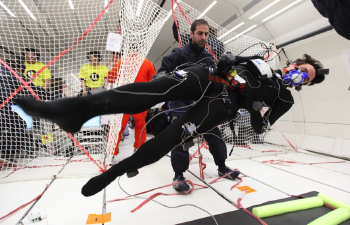
Grad student Pierre Bertrand had an opportunity this summer to conduct experiments in space mobility aboard a reduced-gravity aircraft.
___________________________________
|
 
|

Follow AeroAstro
Don't wait for your enews and emails — keep up with AeroAstro news as it happens — follow the Department on Twitter and Facebook. |
|










 Gopalakrishnan
Gopalakrishnan





 Lozano
Lozano
